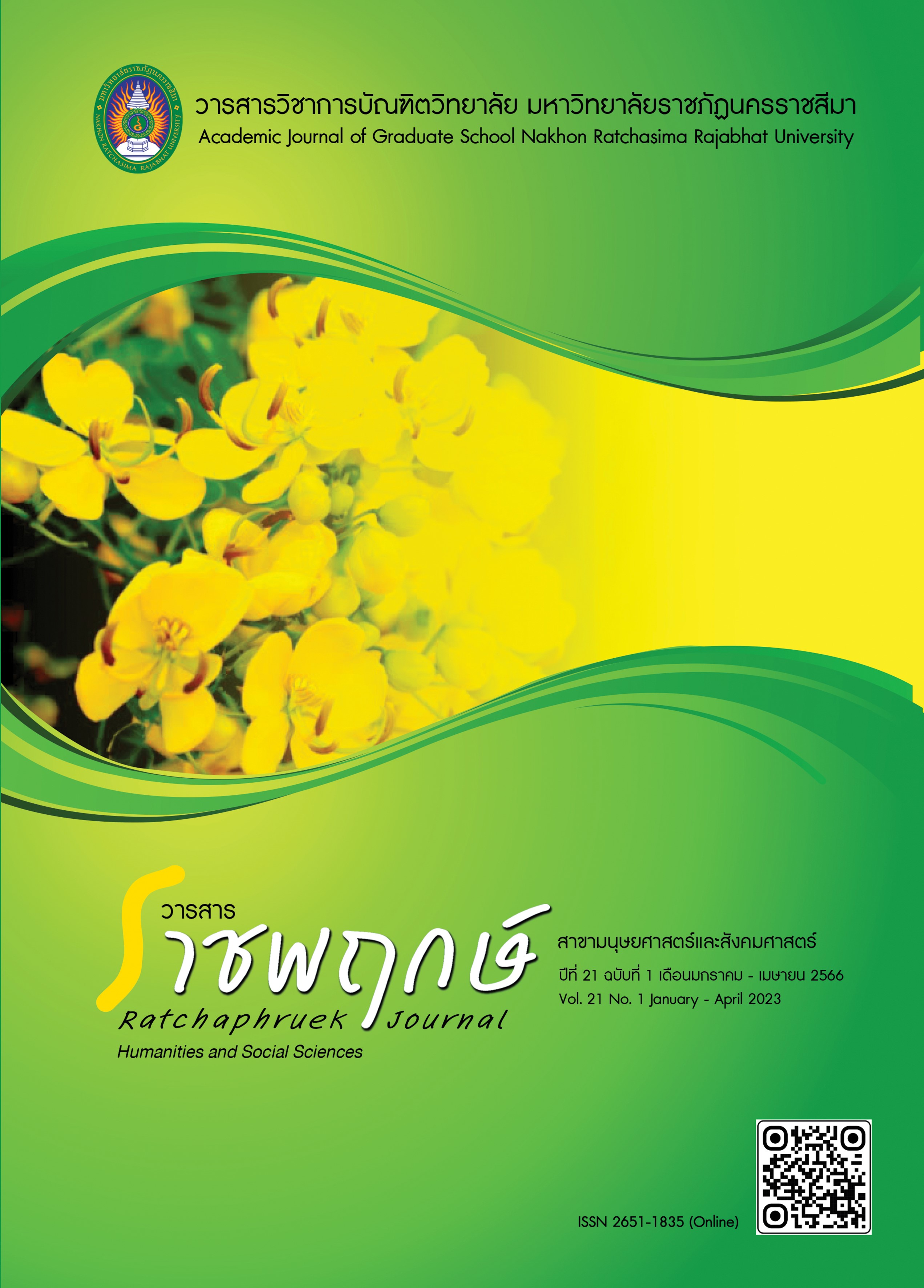The Effects of Self-regulation on Self-discipline of Primary Education Grade 4 Students
Main Article Content
Abstract
The purposes of this experimental research were to: 1) Compare the students’ self-discipline between the experimental group and control group before and after learning; and 2) Compare the self-discipline between the experimental group and the control group. The sample in this study were the fifty-five students who were selected by cluster sampling and voluntarily participate; 30 for the experimental group and 25 for the control group. Research instrument used in the experiment were the 11 Self-Regulation Program time, 1 hours at the time, and the questionnaire. Data were analyzed by mean, standard deviation, and t-test.
The results showed that: After the experiment, the experimental group students have self-discipline scores higher than before the experiment, and than the control group with a statistically significance at the .01 level.
Article Details

This work is licensed under a Creative Commons Attribution-NonCommercial-NoDerivatives 4.0 International License.
References
ณัฐพล โยธา. (2557). การพัฒนาโปรแกรมฝึกวินัยในตนเองด้วยทฤษฎีจริยธรรมสำหรับนักเรียนชั้นประถมศึกษาปีที่ 5 (วิทยานิพนธ์มหาบัณฑิต, มหาวิทยาลัยมหาสารคาม).
นวลศิริ เปาโลหิตย์. (2553). สอนลูกให้มีวินัย (พิมพ์ครั้งที่ 11). กรุงเทพฯ: บี มีเดีย.
บุญชม ศรีสะอาด. (2555). วินัยในตนเองและงานวิจัยทีเกี่ยวข้อง. วารสารการวัดผลการศึกษามหาวิทยาลัยมหาสารคาม, 17(1), น. 3-15.
ปานรดา บัญหนองสา. (2558). การพัฒนาโปรแกรมด้วยวิธีการใช้ตัวแบบสัญลักษณ์เพื่อเสริมสร้างพฤติกรรมความรับผิดชอบและวินัยในตนเองของนักเรียนชั้นมัธยมศึกษาปีที่ 2 (วิทยานิพนธ์มหาบัณฑิต, มหาวิทยาลัยมหาสารคาม).
พัชรินทร์ คัสเตศรี. (2560). การพัฒนาชุดกิจกรรมเพื่อเสริมสร้างวินัยในตนเองของนักเรียนชั้นประถมศึกษาปีที่ 5 โดยใช้กิจกรรมกลุ่มและเทคนิคแม่แบบ (วิทยานิพนธ์มหาบัณฑิต,มหาวิทยาลัยมหาสารคาม).
ยุทธ ไกยวรรณ์. (2558). หลักสถิติวิจัยและการใช้โปรแกรม (พิมพ์ครั้งที่ 4). กรุงเทพฯ: จุฬาลงกรณ์มหาวิทยาลัย.
โรงเรียนสาธิตมหาวิทยาลัยราชภัฏนครราชสีมา. (2564). ปรัชญา วิสัยทัศน์ พันธกิจ ภารกิจ และเป้าหมายของสถานศึกษา. สืบค้นเมื่อ 20 มิถุนายน 2564, จาก http://www.satit.nrru.ac.th/
รานี ลิ้มเจริญ. (2564). ผลของการใช้กิจกรรมพัฒนาผู้เรียนโดยใช้แนวคิดการกำกับตนเอง เพื่อเสริมสร้างวินัยด้านความรับผิดชอบของนักเรียนชั้นประถมศึกษาปีที่ 3 โรงเรียนวัดเชิงกระบือ. วารสารการวัดผลการศึกษามหาวิทยาลัยศรีนครินทรวิโรฒ, 38(104), น. 83-94.
สาวิตรี ไพศาล. (2559). ผลของการใช้โปรแกรมการกำกับตนเองเพื่อเสริมสร้างความมีวินัยของนักเรียนระดับชั้นมัธยมศึกษาตอนต้น โรงเรียนเขาดินวิทยาคาร จังหวัดกาญจนบุรี (วิทยานิพนธ์มหาบัณฑิต, มหาวิทยาลัยศรีนครินทรวิโรฒ).
สำนักงานเลขาธิการสภาการศึกษา. (2560). แผนการศึกษาแห่งชาติ พ.ศ. 2560-2579. กรุงเทพฯ: พริกหวานกราฟฟิค.
อุมาพร ตรังคสมบัติ. (2561). สร้างวินัยให้ลูกคุณ (พิมพ์ครั้งที่ 7). กรุงเทพฯ: ซันต้าการพิมพ์.
Bandura, A. (1991). Social cognitive theory of self-regulation. Organizational Behavior and Human Decision Processes, 50(2), pp. 248-287. Retrieved April 20, 2021, from https://doi.org/10.1016/0749-5978(91)90022-L
Booth, A., Hennessy, E. & Doyle, O. (2018). Self-Regulation: Learning Across Disciplines. Journal of Child and Family Studies, 27, pp. 3767–3781. Retrieved August 27, 2022, from https://doi.org/10.1007/s10826-018-1202-5
Nawantara, R. D., Arofah, L. & Setyaputri, N. Y. (2019). Self-Instruction Technical Guidelines to Improve High School Students’s Self-Discipline. Advances in Social Science, Education and Humanities Research, 387(3), pp. 361-365. Retrieved September 3, 2022, from https://doi.org/10.2991/icei-19.2019.86


